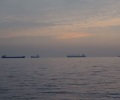The United States issues updated guidance regarding North Korea’s illicit shipping practices

OFAC highlighted a number of tactics used by North Korea and its trade partners to obfuscate the identities of vessels and cargo as well as manipulate information about the origins and destinations of vessels. Therefore, all actors in this sector should be mindful of the following practices:
· Disabling the automatic identification system (AIS) to mask the movements of a vessel: this technique is often used to conceal the origin or destination of cargo, and is a violation of international regulations. For this reason, OFAC recommends that concerned parties (and, in particular, P&I companies) should consider including an “AIS switch-off clause” in contracts for vessels considered to be at risk.
· Physical alteration of a vessel’s identification: North Korea-flagged vessels have illegitimately painted over vessel names and International Maritime Organization (IMO) numbers to obscure their identities and pass themselves off as different vessels.
· Ship-to-ship transfers: this practice is often used to conceal the origin or destination of cargo. Currently North Korea operates a fleet of at least 28 tankers capable of engaging in ship-to-ship transfers of refined petroleum products, and at least 33 ships that are capable of transporting coal.
· Falsifying cargo and vessel documents.
· Manipulating data transmitted via AIS regarding voyage information.
The United States, alongside Australia, Canada, France, Italy, Japan and the United Kingdom, highlighted these deceptive practices at the IMO in an effort to remind all IMO Member States of the requirements and guidance contained in relevant IMO instruments.
In addition, OFAC recommends that members of the international shipping community do the following in an effort to reduce their direct or indirect involvement with North Korea’s illicit shipping practices:
· Research a ship’s history to identify regular AIS manipulation, as part of the due diligence process.
· Monitor AIS disablement and consider investigating vessels that appear to have turned off their AIS in the area surrounding the Korean peninsula or East China Sea, or in the Gulf of Tonkin.
· Promote continuous AIS broadcasts.
· Conduct petroleum supply chain due diligence, as well as end-use checks, in particular for ships that conduct ship-to-ship transfers.
· Conduct research prior to ship-to-ship transfers, ensuring that the vessel name, IMO and flag are verified by operators.
· Review all applicable shipping documentation.
· Ensure clear communication with international partners as to U.S. and UN sanction-related obligations and steps required to ensure compliance with them.
· Make full use of the available resources providing commercial shipping data, ship registry and ship flagging information, including those provided by OFAC, the UN and the U.S. Coast Guard.
The updated guidance document is supplemented by three annexes, in addition to the two already included in the original advisory document. The first annex provides an overview of U.S. sanctions relevant to the shipping industry, the second annex provides a list of the 28 North Korean tankers known to be capable of effecting ship-to-ship transfers, and the new third annex contains specific guidance to avoid the risk of engaging in North Korea-related illicit activities.
How Reed Smith can help
Reed Smith’s Sanctions Team has experience representing companies before OFAC. A global firm, Reed Smith is particularly well positioned to provide guidance on U.S. sanctions and to represent your company before OFAC and other federal agencies implementing U.S. sanctions, such as the U.S. Department of Commerce and the U.S. Department of State, with highly experienced sanctions lawyers from both the United States and the EU available to you, 24/7. Contact one of the authors listed above, or your usual Reed Smith lawyer, and we will be more than happy to help you navigate the implications of these significant events for your business.
Source: Reed Smith (Authors: Leigh T. Hansson, Alex Brandt, Eli Rymland-Kelly and Bianca Casini)

 Hellenic Shipping News Worldwide Hellenic Shipping News Worldwide, Online Daily Newspaper on Hellenic and International Shipping
Hellenic Shipping News Worldwide Hellenic Shipping News Worldwide, Online Daily Newspaper on Hellenic and International Shipping





















 PG-Software
PG-Software